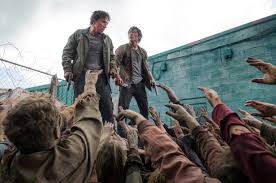 Sometimes eating healthy can be a real pain first thing in the morning. All those traditional breakfast things— toast, French toast, Pop-Tarts, Cheerios, hot oatmeal— all now on our Not For Us foods list.
Sometimes eating healthy can be a real pain first thing in the morning. All those traditional breakfast things— toast, French toast, Pop-Tarts, Cheerios, hot oatmeal— all now on our Not For Us foods list.
But how about some pancakes? Tasty pancakes smothered in butter, perhaps with some sugar-free syrup? We can do that. Here is my favorite pancake recipe, which makes one serving of pancakes.
Cheese Pancakes
2 T (tablespoons) full-fat cottage cheese or cream cheese (or 1 T each)
1 egg
1/2 T ground flaxseed
1/2 T melted butter or melted coconut oil
1/8 t (teaspoon) sea salt or seasoned salt
Put all your ingredients in a small mixing bowl. Yes, even the butter/coconut oil, it’s part of the batter. Use a hand blender or mixer to blend the ingredients until smooth. You can also use a hand-crank egg beater/mixer if you are off the grid, but this will be harder work if you’ve used cream cheese.
Heat up your frying pan for about 5 or 6 minutes. Then add the butter or cooking oil you will be using to fry your pancakes.
Add the batter to the pan. I have used this recipe to make a large pancake of the crepe/blintz variety, but for breakfast pancakes I used to make three pancakes. These pancakes are thin and hard to flip, so you might do 6 or so little ‘silver dollar’ pancakes.
Since I fry my pancakes in butter, I pour leftover melted butter from the pan onto the pancakes once they have been put on my dish. Easier than putting cold butter on them and hoping for it to melt.
You can use this pancake recipe for a variety of purposes. I’ve made a filled low-carb blintz with it. I’m thinking of making a hamburger/cheese filling and making a blintz version of my mom’s cheeseburger turnovers.
Notes on ingredients
Cottage cheese, cream cheese: don’t use low-fat versions of these. You need the fat to make you feel full, and to keep you in a state of ketosis. Most people on ketogenic or strict low-carb diets will find their cholesterol numbers improving on the diet, so don’t worry about the fat.
If you are worried about the dairy— well, it is possible to make a yogurt out of coconut milk (the kind you buy in cans). Don’t use a low-fat variety of coconut milk, and check the labels of different varieties, some have added ingredients you don’t want in your coconut milk. If the coconut yogurt doesn’t work so well in the recipe, perhaps you could make coconut yogurt cheese— you put yogurt in a strainer lined with a coffee filter overnight, letting the whey (or whatever that stuff is) drain off. I have done this with home-made dairy-milk yogurt, but haven’t tried it with coconut milk yogurt. Dana Carpender’s recipe book 200 Low-Carb High-Fat Recipes has a recipe for coconut yogurt on page 51. I find her recipe books VERY useful, so I’d suggest giving her a try.
Ground flaxseed: In the original recipe I adapted for these pancakes, it called for soy flour. I don’t care to put soy in my diet, except for soy sauce, so I have tried alternatives. Ground almond, pecan or walnut is nice but the batter will be thinner. Ground flaxseed plumps up the batter a bit. A little bit.
Butter/Coconut Oil: You may have read old-fashioned recommendations to avoid butter at all costs. The up-to-date science says otherwise. And coconut oil is very good for a ketogenic diet— a diet which is proven to be good for your heart.
Salt: When you stopped eating a processed food diet and started eating a healthy low-carb/ketogenic/Paleo diet, you cut out most of the sources of salt in your diet. Many of us when we start cooking healthy omit the salt. Don’t do this. Salt makes food taste better, and tasty low-carb food helps you resist the temptation to have ‘just a little’ processed food. Also, you can actually feel sick after a rapid switch from salty processed food to very-low-salt home-cooked low carb food. And your blood tests can show that your sodium is low.






